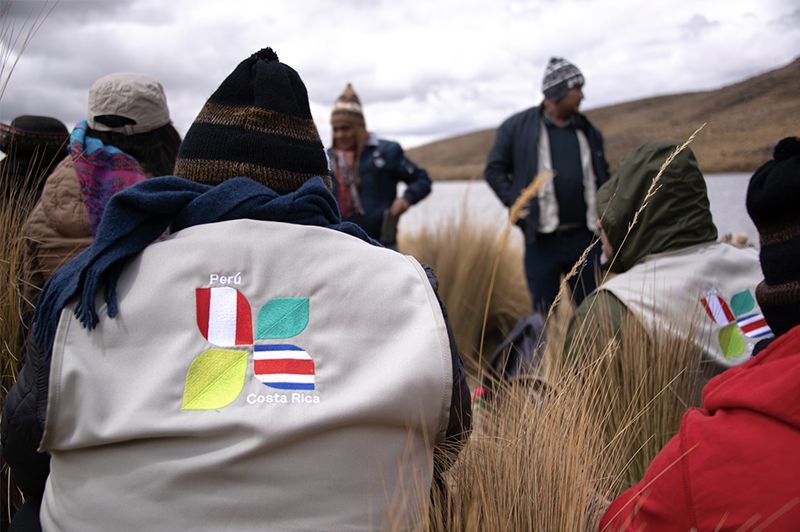More than 12,000 producers in Guanacaste are benefitting from access to water, improving their agriculture and livestock. The Initiative aims to be replicated in the Central American Dry Corridor.
Guanacaste, 04 June 2021. Until 2019, most agricultural producers in the province of Guanacaste, Costa Rica, faced serious problems of water shortages that were intensified by changes in the climate. "There was always flooding due to heavy rains, which affected our livestock and agriculture, and we didn't know of any technique that would allow us to conserve water," says Maximiliano Murillo Campos (49), who lives in Guanacaste and makes his living from various agricultural activities, for which access to water is fundamental.
Aware of this problem, the specialists of the binational project Sowing and Harvesting Water and Ecosystem Services of the EUROCLIMA+ Programme, implemented between February 2019 and February 2021 by the Association for Research and Rural Development (AIDER) and the Forestry Financing Fund (FONAFIFO), decided to work hand in hand with the women of the Bartolomé Ayala Association (ABA) of Ayacucho, Peru. These women apply ancestral knowledge called "sowing and harvesting water", which allows them to build natural infrastructure (reservoirs), store rainwater, increase its infiltration and use it in times of drought.
This practice was transferred from Ayacucho to Guanacaste, and through the project, seven reservoirs with a capacity of 35,000 cubic metres have been implemented. With Costa Rican inputs and based on the Andean experience, a technological package for planting and harvesting rainwater has been developed for the Central American country, which ensures the availability of water in dry months and improves capacity for adaptation to climate change.
"Planting and Harvesting Water, and Ecosystem Services is a triangular project between authorities and communities in Peru, and authorities and communities in Costa Rica. Costa Rica is an exemplary country from the point of view of adaptation to climate change and the search for new solutions based on nature," says María Antonieta Calvo, European Union Ambassador in Costa Rica.
The construction and infrastructure of the reservoirs has a low cost, ranging from 2.5 to 4,000 Euros (3,000 to 5,000 USD), and it takes 8 to 15 days for the reservoirs to be ready for use.
The initiative has become the basis for a rainwater planting and harvesting programme that will benefit more than 12,000 producers in Guanacaste. In turn, livestock and agriculture of maize, beans and vegetables will be strengthened, contributing to food security.
Ancestral knowledge has also been shared with the inhabitants of the district of Pacaipampa in the Piura region (on the coast of Peru), where two reservoirs with a capacity of 20,000 cubic metres were built, enabling the people to cope with the harsh droughts.
Access to water through South-South cooperation
Given the environmental and economic benefits of the planting and harvesting of water promoted by the project, the Rural Development Institute (INDER) in Costa Rica has invested $125,000 USD in the construction of 28 additional reservoirs, thus demonstrating the Costa Rican government's involvement in tackling climate change through this ancient technique.
Sidey Cortes Osorno, INDER's territorial advisor, argues that it is important to recognise the transfer of knowledge from Peru to Costa Rica.
“The coordination and articulation of public, private and local government institutions has been fundamental for the Water Planting and Harvesting project. INDER has involved the steering committees of the territorial councils where civil society actors also participate," explains Cortes.
Through a process of South-South cooperation - which is a collaboration between traditional donor countries and organisations from countries in the Global South that facilitate initiatives through counterparts and management -- Peru has provided knowledge for the construction of reservoirs and Costa Rica has contributed its experience and knowledge of more than 20 years in the system of Payment for Environmental Services (PES), also known as Payment for Ecosystem Services, which are recognitions to the owners or managers of ecosystems that provide some type of service such as water regulation and quality.
“The reservoirs are allowing many families in Guanacaste, who sometimes face significant droughts, to improve their income, the productivity of their farms, and diversify their activities. The Rural Development Institute (INDER) is scaling up and replicating this investment," says Andrea Meza, Costa Rica's Minister of Environment and Energy.
In Ayacucho, where the women of ABA live, and in Piura, through AIDER and with the advice of Costa Rican specialists, a Payment for Ecosystem Services Programme was designed so that the populations of Ayacucho and Piura can implement mechanisms of retribution for the conservation and protection of water. The Central America Bottling Corporation (CBC), a bottling company of well-known beverage brands, has recognised the efforts of the inhabitants of the upper Piura River basin in the conservation of paramos and it is developing actions to work hand in hand with the population.
Environmental policies for tackling climate change
Peru and Costa Rica are two countries particularly vulnerable to climate change, and their populations face problems such as changing rainfall patterns, droughts, floods, among others. In order to advance the creation of climate policies that contribute to the Nationally Determined Contributions (NDCs), the project has proposed a Decree on rainwater planting and harvesting in Costa Rica and Peru.
In Costa Rica and thanks to the project, it has been possible to contribute to two documents that are the basis of the NDCs, the Adaptation Plan and the Decarbonisation Plan, with a landscape approach to promote natural infrastructure and contribute to good water management.
“We want the constructed reservoirs to become a driving force to develop agricultural, livestock and tourism activities, to ensure access to water in dry periods and to improve the adaptive capacity of the populations," says Gustavo Solano, the project's binational director.
From the local to the global: planting and harvesting water for Central America
The Central American Dry Corridor, made up of Mexico at its southern end, Guatemala, El Salvador, Honduras, Nicaragua, Costa Rica and Panama, is an area highly exposed to continuous droughts - which have intensified due to climate change - and it presents water management problems. In view of this, the construction of reservoirs may be one of the most cost-effective actions to be implemented.
“We have met with government representatives in Honduras, Nicaragua and El Salvador to establish possible partnerships for the development of water planting and harvesting in these countries and the response has been very positive," says Jaime Nalvarte, executive director of AIDER.
The Water Planting and Harvesting project has managed to export ancestral knowledge and adapt it to Costa Rica. Innovation and partnerships have been at the heart of the action that is enabling the project's stability and replicability. In addition, it has been demonstrated that, with the contribution of the governments, the private sector and NGOs, it is possible to recover ancestral knowledge and put it at the service of different communities who can adapt to the effects of climate change in Latin America and the Caribbean.
Learn more about the project in Costa Rica
DATA
- The project "Planting and Harvesting Water and Ecosystem Services is part of the thematic sector "Forests, Biodiversity and Ecosystems" of the EUROCLIMA+ programme, implemented by EF and GIZ. It was developed from February 2019 to February 2021. Find out more here
- The second phase of the project "Governance for Rainwater Harvesting with Gender Equity and Interculturality in the Framework of South-South Cooperation" will be developed from March 2021 to January 2022.
About EUROCLIMA+
EUROCLIMA+ is a programme funded by the European Union and co-financed by the German Federal Government through the Federal Ministry for Economic Cooperation and Development (BMZ), as well as by the governments of France and Spain. Its objective is to reduce the impact of climate change and its effects in 18 Latin American and Caribbean countries by promoting climate change mitigation and adaptation, resilience and investment. The Programme is implemented under the synergistic work of seven agencies: the Spanish Agency for International Development Cooperation (AECID), the French Development Agency (AFD), the Economic Commission for Latin America and the Caribbean (ECLAC), Expertise France (EF), the International and Ibero-America Foundation for Administration and Public Policy (FIIAPP), the German Society for International Cooperation (GIZ), and UN Environment.
Contact for more information: This email address is being protected from spambots. You need JavaScript enabled to view it.




